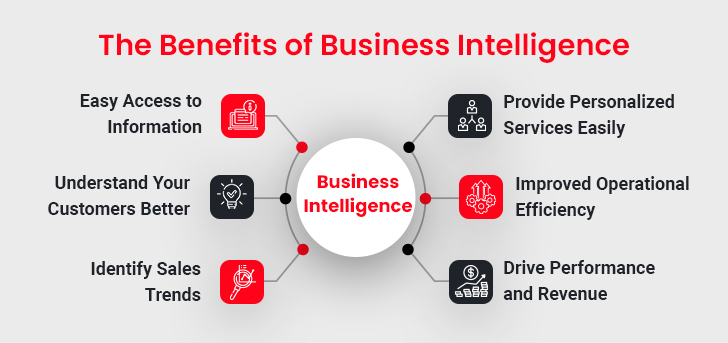Embracing the transformative Business Intelligence and Analytics trends is not just advantageous but a strategic imperative to identify opportunities, forecast trends, mitigate risks in real-time, and gain a competitive edge. Embarking on this exploration will empower decision-makers to drive innovation, streamline processes, and make informed decisions in an era where data reigns supreme.

In other words, decision-makers will gain a comprehensive understanding of how these emerging technology trends are reshaping traditional business paradigms. Before diving deep into the trends that will revolutionize business trends, let’s take a sneak peek at the business benefits of Business Intelligence.

Cultivating Business Intelligence Maturity in the Dynamic Landscape
Since data has taken an omnipresent role in operations, service, delivery, and management – playing an ever-important part in the business – business leaders must not defer taking the help of business intelligence.
We observe that the need of the hour is establishing long-term goals and monitoring upcoming analytics trends. It can help businesses keep the DA and BI setup relevant for the longer part of its life. Yet, instead of jumping the gun, leaders must identify business use cases and prioritize goals by balancing CapEx and OpEx with ROI. So, what’s in store industry in the new year?
Upcoming Trends in Data Analytics and Business Intelligence
Below are the top five picks of Data Analytics and Business Intelligence trends that cover the mandates of most industries and departments. With these, we nudge leaders/stakeholders to look beyond the low-hanging fruits and build the businesses of tomorrow.
1. AI apps for streamlining DA & BI
Many organizations will begin to operationalize artificial intelligence-powered applications sooner, to reinforce the data and analytics infrastructures. The principal driving force behind this acceleration is the urgency to implement intelligent automation, secure parameters for the virtual workforce, and mitigate the deficit of skilled resources, especially in labor-intensive processes.
2. Bot enabled self-service reporting
When teams are not co-located, collaborating on data – especially sensitive and restricted one – involves much to and fro through emails. To enable self-service reporting, interactive bots that push and pull reports will emerge as the staple technology in perfect unison with multi-layered accesses.
3. Rise of Information as a Service
Information is the new currency. Data-savant organizations will support enterprises through information delivery in a business-friendly format, tailored to the unique needs of consumers. It will mitigate the speed of technology churn which is a persistent pain-point of larger organizations.
4. Blockchain to improve data and analytics ROI
An increasing number of organizations will adopt Chain codes or intelligent contracts. With established advantages such as security and compliance adherence, blockchain solutions will improve overall data quality. It should help push the ROI bottom line in domains like RegTech and FinTech.
5. Analyzing what is not analyzed yet
Organizations with a higher level of analytics maturity will need new substrates. Hence, The new year will see the rise of video, audio, text, content, and sentiment analytics – paving the way for new insights, especially in the realm of consumer experience, media, and AR/VR product companies.
How to Use Power BI for Data Visualization and Analysis
6. Data democratization
Data democratization is another upcoming trend that focuses on making BI and data analytics accessible to a wide range of users within an enterprise. Earlier, BI and data analytics were often limited to specialized groups or teams, creating bottlenecks in information flow. However, data democratization will break down these silos by empowering individuals across various business functions with the ability to access, analyze, and decode data. This democratization is facilitated by user-friendly dashboards, intuitive self-service analytics tools, and training programs that empower employees with varying levels of technical expertise to unlock the potential of data. As enterprises embrace data democratization, they foster a collaborative and more inclusive culture where actionable insights can emerge from diverse perspectives, driving innovation and informed decision-making across all levels.
Democratize Data With Power BI for Informed Decision-making
Summing Up
Setting up Data Analytics and BI will provide everyone the insights to align their vision, strategy, and goals with the organization. If you are also planning to embrace Data Analytics with Power BI to drive innovation and make informed business decisions, it’s strongly recommended to seek end-to-end consultation from a professional Power BI analytics company.





